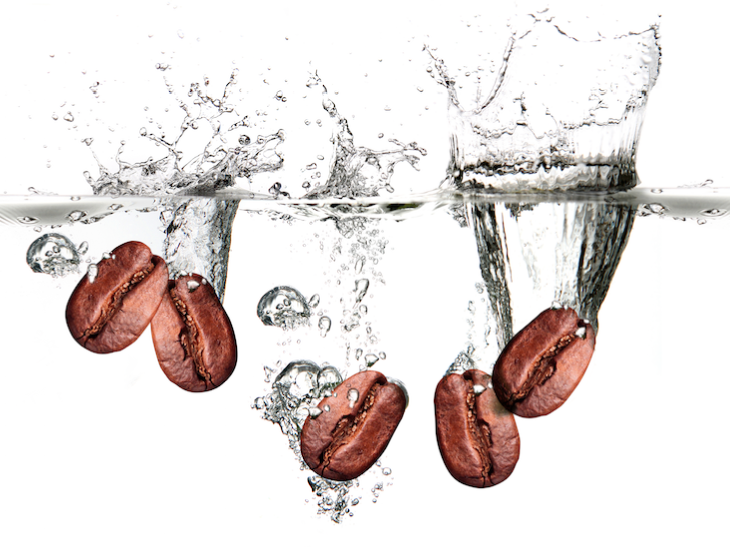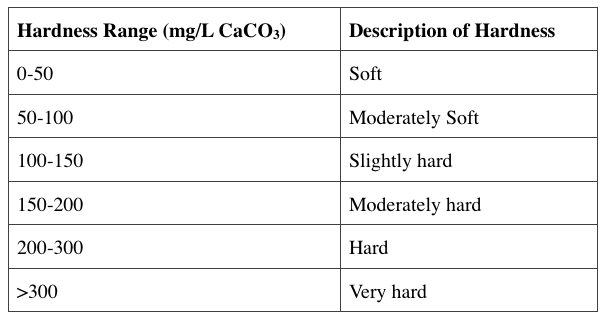
Your coffee is 98%water. It makes sense then that we should take a little care in what water we use for our coffee, especially when buying top quality beans from your favourite local roaster. We try control all the other elements of our coffee brewing like temperature of the water, grind size – water quality should be no different. Bad water makes bad coffee. Here are some fast facts:
What are the main minerals that effect coffee flavour?
As rainwater falls, it is naturally soft. However, as water makes its way through the ground and into our waterways, it picks up minerals like chalk, lime and mostly calcium and magnesium. Water hardness is a measure of the amount of magnesium and calcium that is dissolved in water. Water rich in these two minerals (magnesium in particular) are great at bringing out the best in coffee flavoring compounds. If the water is too hard though, the effect is also not good and can be very detrimental for equipment. On the other hand, soft water tastes salty and is sometimes not suitable for drinking. Everything in moderation!
So to get a flavourful coffee, there must be some mineral content in the water. If the water is distilled, or if it has been softened too much (softening is the process of removing minerals), the extraction will be weak, and the beverage will be relatively flavourless.
What is the international standard?
Ronny Billemon, WQA Master Water Specialist that works at Pentair International and is in charge of creating the water for the World Barista Championship has this advice to offer:
“For WBC, over the past years we have been using in average a water with +/- 120 – 130 ppm mineral concentration conductivity and a pH +/- 7.
Which positions us right within the “ideal world” for optimal extraction, quality crema on the espresso and finest aroma and flavor development. This water spec guidance can be used for all levels of coffee brewing. Yet, for specialty coffee – single origin coffee filter brewing - they quite often the lower TDS range with a focus on the finest aroma and flavors rather than body in the cup.”
Lower range mineral concentration (> 50 ppm): Brings a bright, pure balanced coffee with the finest aromas and flavors making the difference, however, a lower body development in the cup.
Water with a higher mineral content (> 100 ppm): Will deliver a richer coffee flavor, more body, balanced and deliver stronger crema on the espresso.
 Mineral content is measured in Parts Per Million. Hardness range is measuring Magnesium, Calcium and Bicarbonate. SCAA recommended TDS: 150ppm
Mineral content is measured in Parts Per Million. Hardness range is measuring Magnesium, Calcium and Bicarbonate. SCAA recommended TDS: 150ppm
Where does South African municipal water sit on this spectrum?
In South Africa we are relatively well off in terms of the quality of the municipal water that comes through our taps. Water in Rand Water’s area of supply (Gauteng municipalities) ranges from 60 to 110 mg/lCaCO3, thus they have a moderately soft to slightly hard water. At the SCASA National Barista Championships held in Durban last year, the water was brought into question as being too soft, which led to the flavour of the coffees being dulled.
Maxwell Colonna-Dashwood, who wrote an entire book along with Christopher Hendon called Water for Coffee says “Your ideal solution varies depending on your water source. Currently your most sensible solution is to understand your water source to decide which treatment you should use.” You should also check out his new water jug project, Peak Water. Also, did you know that Maxwell is coming to South Africa?! Check out Creative Coffee Week here.
You can visit our full guide on water in SA’s major city centres here.
What are your options?
Carbon Filter- If you are unhappy with the caliber of your at-home water, the first option that you have is to filter it. The SCAA water brewing guidelines state that water should be clean, odor-free, clear with no chlorine. Pitcher filters use activated carbon to remove some water impurities, odors as well as chlorine or chloramine if they are present. These types of filters are cheap and readily available. There are also faucet-mounted filters of this type.
Reverse Osmosis - Reverse osmosis (RO) is a process where all the minerals are taken out of the water. What is left is water that has virtually nothing in it. You would think that this would be ideal for brewing coffee, but it is not. Brewing with straight reverse osmosis water will produce a flat cup of coffee not unlike the coffee made with soft water. Reverse osmosis water is missing all those magnesium and calcium minerals that enhance coffee flavor.
Bottled Water – You can always brew your coffee with bottled water, however this is not a cut and dry issue either. Not all bottled waters are created equal, in fact, they can vary wildly in mineral content, pH and suitability for coffee.